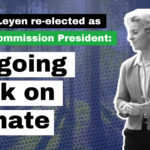Transport emissions in the EU’s Member States keep rising. If the EU is serious about achieving the Paris Agreement’s 1.5°C objective, European transport policies must radically change. The report, published today by CAN Europe members, assesses transport policies of the EU and five of its member States, and makes recommendations to bring transport policies in line with the Paris Agreement.
The report “Bringing European Transport Policies on the climate neutrality track” shows that Member States do not have a unified approach in internalizing the external costs and that this creates inconsistent and contradictory market signals at the EU level. For instance, in France 180% of the external costs of passenger rail travel are internalised, while only 59% for car travel and just 8% for air travel, and this despite the fact that European transport is still dominated by fossil fuel powered cars while passenger rail travel is much less polluting than car and air travel.
The document also underlines that even in smaller European countries, aviation has become a means of relatively short distance domestic travel. For example, in Denmark, where it is not possible to fly further than 300 km, the share of passengers flying within the country reached 9% of the overall Danish air market in 2018. Both France and Germany, despite their relatively good offers of high speed railway lines, have also witnessed very high shares of domestic air passenger travel, respectively 33% and 18%. One of the reasons for this is the availability of cheap air travel tickets, compared to railway tickets. The report recommends creating strategic action plans to shift short-haul flights to rail connections, especially high speed rail, by ensuring that external costs of air travel are properly internalized.
The report also finds out that the modal shift in the transport sector is currently not as widely promoted as the fuel shift. Only Germany has its own goal to double the number of rail passengers from 2020 to 2030. In addition, the country is developing policies and measures aimed at changing passenger travel, such as a reduction of taxes on long distance railway tickets and additional taxation on air travel. These measures are not present in any other studied country.
The report includes sectoral recommendations, with the most important one underlining that transport emissions reduction targets should be strengthened and remain part of national emission reductions targets under the Effort Sharing Regulation. The EU should ask Member States to draw-up transport policy targets and plans that could be set and/ or strengthened in their National Energy and Climate Plans (NECPs) allowing emission reductions progress and coherence with other policies to be easily monitored.
Director of Climate Action Network (CAN) Europe, Wendel Trio said: “Reducing emissions from the transport sector will play a crucial role in achieving the Paris Agreement’s 1.5°C goal. Therefore, it is very important to keep the transport sector under the Effort Sharing Regulation and increase nationally binding targets, as well as strengthening national and EU-level policies. This report is a good reminder that measures taken to accelerate emission reductions can and must bring social benefits, such as increased connectivity and less expensive public transport. This transition must help those in need to have access to sustainable and affordable transport.”
Wojciech Szymalski, Institute for Sustainable Development Foundation, Poland: “Transport is yet the toughest of all sectors to decarbonise. None of the analysed countries is on track to make the real change. EU policy is making only a little difference. Moreover, almost every country wants to transport more people and freight and at the same produce less emissions. This is not possible and we need a paradigm shift in the transport sector: setting a threshold on personal car travel, a massive shift towards public transport, investments in railways, as well as cycling and net zero emissions transport in the cities. This requires also a strong shift in people’s attitudes and customs to travel and freight transport. Why should air travel still be a first option, when we can talk on-line or take high speed trains? The EU and its member states must be bold enough to make radical changes in the transport sector if it is serious about addressing the climate crisis.”
Agathe Bounfour, Transport officer at Réseau Action Climat France said: “The report shows that transport is Europe’s one of the biggest challenges in addressing the climate crisis, and that Member States are not even properly talking about it. There is a clear lack of action on demand management and fiscal policies to encourage modal shift from road or air to the rail network. Key opportunities at the EU and national levels will need to be seized in the next months.”
Brigitta Bozsó, Climate Policy Coordinator at Climate Action Network (CAN) Europe said: “Until now, the EU and Member States failed to address the growing transport emissions. It is clear that to limit temperature rise to 1.5°C, we need structural change in the transport sector, not a patchwork of limited policy adjustments.
The new climate and energy legislation must turn the tide, curb emissions by setting nationally binding targets and encouraging bold and ambitious action in the transport sector.”
ENDS
Contact: Goksen Sahin, CAN Europe Project Manager, goksen@caneurope.org
Report can be downloaded here: FINAL TRANSPORT REPORT


